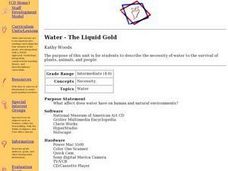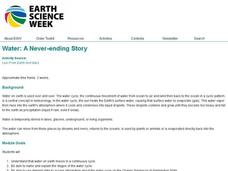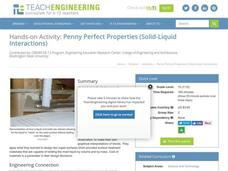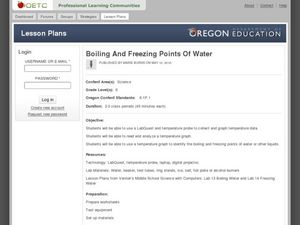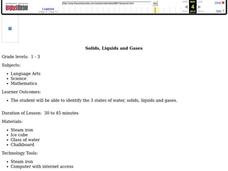Curated OER
Water Cycle Reading and Writing
Here is a great way to get pupils to express a scientific concept in a fun way. After hearing the story of Walter the Water drop and learning facts about the water cycle, the class will write a creative expository piece describing what...
Curated OER
Water-The Liquid Gold
Students investigate the necessity of water for the survival of plants, animals, and people. They explore the affect that water has on human and natural environments through literature, field trips, and discussions.
Curated OER
Water 1: Water and Ice
Learners explore the states of water. In this science lesson plan, students use observation, measurement, and communication skills to describe water as it changes from a solid to a liquid.
American Chemical Society
Liquids Have Properties
Liquids have many similarities, but their differences can set them apart. Using a student activity guide, learners conduct different property tests on water, oil, and syrup. They record their results and use them to rank the liquids by...
American Chemical Society
Liquids - Clearly Unique
Bring chemistry to life for scholars as they perform two tests to examine the unique properties of three liquids. Classroom investigators make observations, develop basic lab skills, and follow step-by-step instructions to compare water,...
Curated OER
Water: A Neverending Story
Students investigate the water cycle. In this water cycle science lesson, students participate in a series of activities that demonstrate evaporation, precipitation, and condensation. Students describe their observations using water...
Center for Learning in Action
Water – Changing States (Part 2)
Here is part two of a two-part lesson in which scholars investigate the changing states of water—liquid, solid, and gas—and how energy from heat changes its molecules. With grand conversation, two demonstrations, and one hands-on...
DiscoverE
Electrical Liquids
Liquid or not, here comes the electricity. Scholars test the conductivity of various substances using a circuit that includes a light bulb. If the light bulb lights up, then the liquid is a conductor. What a bright idea!
NASA
Cleaning Water
Give young scientists a new appreciation of fresh, clean drinking water. After learning about the ways astronauts recycle their air and water, your class will work in small groups creating and testing their very own water filtration...
Curated OER
Properties of Water
Students study the three physical properties of water-solid, liquid and gas. They classify materials as solids, liquids, and gases. They define the terms solids, liquids and matter and explain that when materials are manipulated,...
Curated OER
Water and Ice
Students explore water and how it changes forms. In this investigative lesson plan students participate in an activity that shows them how water changes form and what it looks and feels like.
Curated OER
Water Cycle Bracelets
Students engage in a lesson that investigates the hydrological cycle. They create bracelets with different colored beads that represent parts of the cycle. Students can follow the cycle in the order of the beads. The lesson includes...
Curated OER
Water Monitoring Vocabulary
As the title implies, this is a list of vocabulary terms relating to water monitoring. If your ecology class is learning about how to test water quality, this will be an appropriate reference sheet for them. As a bonus, if you live in...
American Chemical Society
Density: Sink and Float for Liquids
We don't think of liquids as floating typically, but a quick look at any oil spill tells a different story. Lesson explores various densities of liquids and why this fact is important. After observing the density variation, scholars...
American Chemical Society
Why Does Water Dissolve Sugar?
Did you know that if you wait long enough, the M on the outside of an M and M will float to the surface when submerged in water? Learners observe the sugar coating of an M and M while it is dissolving in water. They explain how this...
American Chemical Society
Finding Volume: The Water Displacement Method
We have formulas for finding the volume of geometric shapes, but what if the shape is irregular? Lesson describes how to find volume through water displacement. After a demonstration, scholars practice in small groups. Then analysis...
Teach Engineering
Penny Perfect Properties (Solid-Liquid Interations)
I can get more water to stay on a penny than you can! Collaborative pairs determine the volume of liquids that can be contained on the surface of copper pennies and plastic coins. The pairs analyze their results using graphs and go on to...
Curated OER
Boiling and Freezing Points of Water
Challenge your sixth graders with this lesson about the freezing and boiling points of water. In these activities learners graph temperature data, read and analyze information, and identify the freezing and boiling points of water and...
Curated OER
Earth's Water
If the majority of our planet is covered with water, why do we need to bother conserving it? With a thorough and varied investigation into the location and types of water on the earth, learners will gain an understanding of why this...
University of Waikato
Temperature, Salinity and Water Density
The difference between sinking and floating may be a little salt. Young experimenters analyze the effect of salt and temperature on the density of water. They use their results to predict the effect of climate change on ocean ecosystems.
Curated OER
Solids, Liquids and Gases
Students explore solids, liquids, and gases. In this states of water lesson, students conduct a scientific investigation that requires them to observe and note the differences among solid, liquids, and gases.
Curated OER
Properties of Liquids
Learners describe properties of liquids and use descriptive language as a springboard to develop precise vocabulary for properties of liquids. They also use vocabulary as practiced with liquid-vocabulary card games. Finally, students...
Nuffield Foundation
Observing Water Moving Through Plants
We know plants assist in the water cycle, but how do plants get water from the ground into the air? Through a series of demonstrations or labs, scholars observe the movement of water through plants. They microscopically view the cells...
Curated OER
Galileo's Thermometer: Measuring the Density of Various Unknown Liquids
Sprouting scientists explore the concept of density by making mass and volume measurements for five different liquids. From these measurements, they calculate densities. They apply their learning to explain Galileo's thermometer works...



